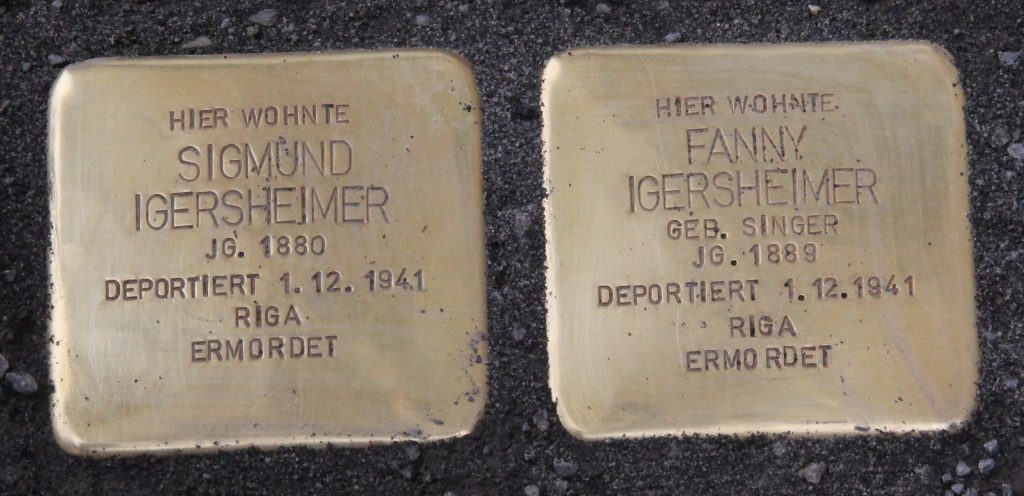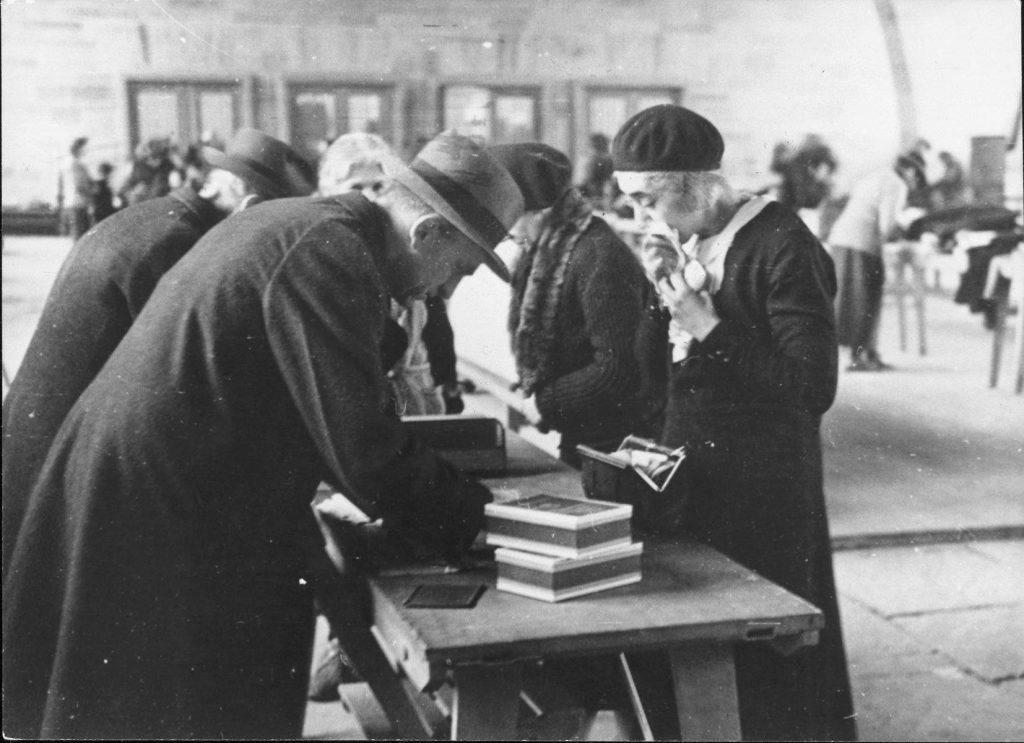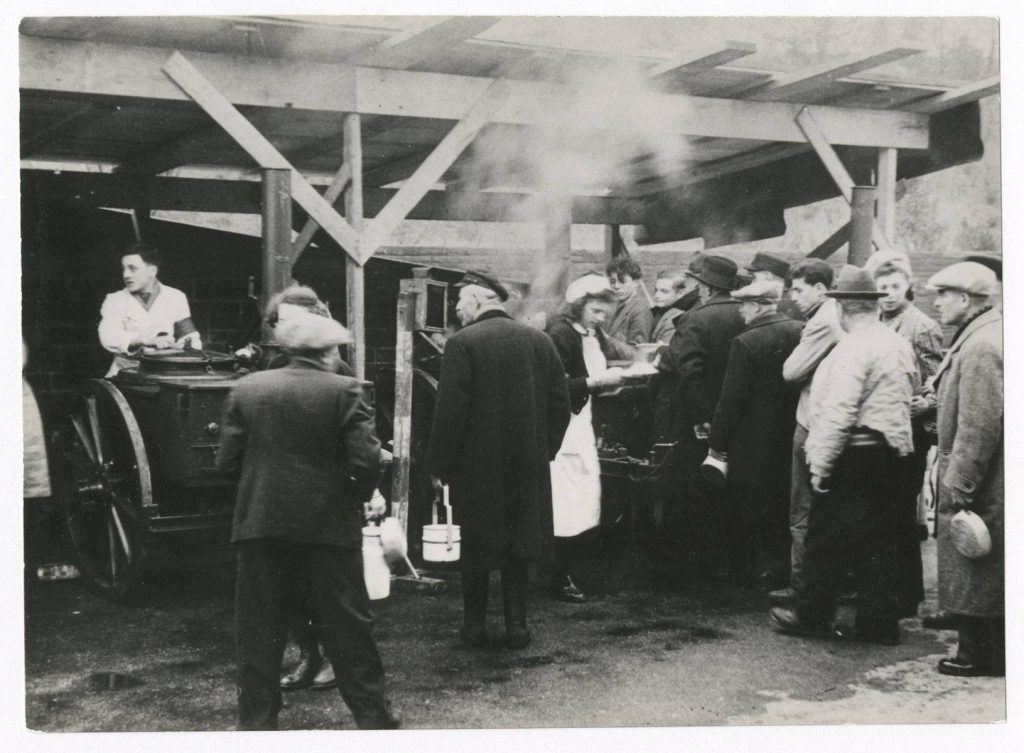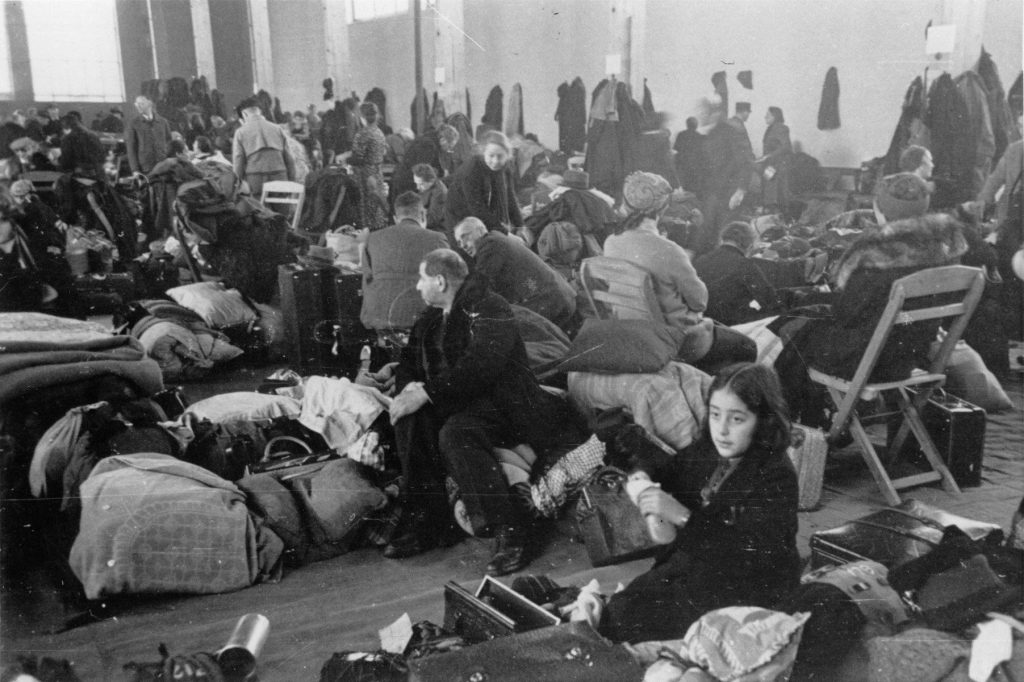
Lage: Kapuzinergasse 14 – Bad Mergentheim
Together with his wife Fanny, née Singer, who came from Hechingen, Sigmund Igersheimer ran a store for shoe goods and men’s and boys’ ready-to-wear clothing at Kapuzinerstraße 14.
Sigmund Igersheimer was born on August 6, 1880 and took over his father’s business in the fourth generation. The family had been citizens of the city since 1829. The house in Kapuzinerstraße had been in the family since 1842.
It is no longer known when he married his wife Fanny, born on July 14, 1889, but it is known that they had two children.
His son Alfred, born on December 18, 1913, survived the Holocaust in Palestine, from where he returned to Germany (Frankfurt) after the war and where he died on June 25, 1989. When and for what reasons he remigrated is not known. However, a Frankfurt address book from 1970 proves that he was already living in the city at that time.
A second son, Erich, born on 3.1.1920, died at the age of 10 months.
Sigmund and Fanny Igersheimer sold their business already before January 1, 1938 – the cut-off date after which Jews were no longer allowed to own commercial enterprises, thus losing their basis of income.
Whether the proceeds from this sale were less than the actual value cannot be said with certainty. But in these Aryanizations, the hardship of the Jewish sellers was regularly used to drive down the price.
Under the increasing pressure of the Nazi regime, the couple moved to Stuttgart on July 5, 1938, and from there to Baisingen. The reason for this second move is not known with certainty. However, “in the spring of 1941, a larger number of Jewish persons were forcibly transferred [to Baisingen] from Stuttgart and other cities.”[1] The reason for this move is not known for certain. Which is why it can be assumed that the move took place in this context.
The last “sign of life” of Fanny and Sigmund Igersheimer are their names on the deportation list for the first collective transport of Stuttgart Jews to Riga or Jungfernhof, which left for the East on December 1, 1941. Of about 1000 people on this first transport, fewer than 50 survived[2] – Sigmund and Fanny Igersheimer were not among them.
Helmut Gabeli writes about the deportation of the Württemberg Jews:
The deportation of the Jews from the German Reich is declared a “secret Reich matter” and carried out in the style of a gigantic police action. […] With a decree of the Secret State Police of November 18, 1941, the Gestapo announces the upcoming transport:
“Within the framework of the pan-European de-Jewification, railroad transports with 1,000 Jews each from the Old Reich […] are currently going to the Reichskommissariat Ostland. Württemberg is initially involved in this with a transport of 1,000 Jews, which departs from Stuttgart on December 1, 1941. […] The Jews in question were already registered here in terms of numbers and personnel.”
The formal legal basis for the confiscation of Jewish assets is the “11th Ordinance to the Reich Citizenship Law of November 25, 1941,” according to which a Jew loses German citizenship if he moves his residence abroad. If a Jew loses German citizenship, his assets are forfeited to the Reich. Deportation is considered by the Nazis to be a transfer of residence abroad and the assets go to the German Reich[3].
The Secret Reich Case also stipulates that the “Jews in question” were notified on the same day, i.e., November 18, 1941, with a “circular letter (registered letter[4]) enclosed in multiple copies”[5] and given a transport number. By now, at the latest, Fanny and Sigmund were only a “number,” ceased to be Fanny and Sigmund Igersheimer for the bureaucracy. They themselves will probably have received this registered letter in the course of the week, i.e. by November 22.
In the case of the Baisinger Jews, to whom Mr. and Mrs. Igersheimer belonged at that time, a carter involved in the transport remembers in an interview conducted in 1987 that one evening in November (presumably the evening before November 27, 1941) he was ordered by a Landjäger “to have his cart ready in front of the town hall at three o’clock the next morning.
‘I asked what was being driven.’ He said he couldn’t tell me. So I said that they wouldn’t be driving there either. We almost started a quarell until he said, ‘The Jews are leaving.'”[6].
And with regard to the next day, he continues:
“Well, then they loaded up the people. There were older women, of course, two coats on, what they could have put on. They were allowed to take parcels with 30 pounds or 50 pounds. My brother-in-law then loaded them onto his wagon, and I took the people inside, and at 7 a.m. we had to be in Horb at the freight station. There they were loaded”.
What is not mentioned here is that “Before transferring the […] transports to here [i.e. Stuttgart] […] the local police authority had to conduct a thorough search for weapons, ammunition, explosives, poison, foreign currency, jewelry, etc.”[7].

Stadtarchiv Stuttgart 9200 Fotosammlung F 1440 719 
Stadtarchiv Stuttgart 9200 Fotosammlung F 2231/1 
Stadtarchiv Stuttgart 9200 Fotosammlung F 2231/3
The next stop for Sigmund and Fanny Igersheimer was Stuttgart’s Killesberg. Here “the grounds of the 3rd Reich Garden Show in 1939 […] [functioned as a collection camp]. Between November 24 and 26, luggage was to be delivered there or to the community center in Hospitalstraße. Since November 27, those affected from the rural communities, accompanied by order police officers, arrived in Stuttgart in special compartments or cars of regular trains. While visitation and registration took place in the so-called Hall of Honor of the Reichsnährstand, the people had to camp in crowded confinement in the Blumenhalle for several days and nights. For the deportation, the victims had to pay a ticket as well as acknowledge the confiscation of their (mostly barely existing) property. A film commissioned by the Stapoleitstelle or the city about the collection camp is a document of despair and cruelty at the same time.”[8].
Based on the deportation lists, it is known that there were nine other Jews from Mergentheim[9], 10 Jews from Edelfingen[10] and 6 from Igersheim[11] in this deportation train – they also perished on the transport or in Riga.
1. http://alemannia-judaica.de/baisingen_synagoge.htm (Zugriff: 10.11.2020)
2. Vgl. https://de.wikipedia.org/wiki/Gut_Jungfernhof_(Lager) (Zugriff: 10.11.2020)
3. Helmut Gabeli, „Evakuiert“ und „Unbekannt verzogen“: Die Deportation der Juden aus Württemberg und Hohenzollern 1941 bis 1945, in: Landeszentrale für politische Bildung Baden-Württemberg (Hrsg.), „Evakuiert“ und „Unbekannt verzogen“: Die Deportation der Juden aus Württemberg und Hohenzollern 1941 bis 1945, MATERIALIEN, Stuttgart 2008, S. 15f.
4. Deportationsbescheid: Benachrichtigungsschreiben Deportation, Schreiben und Anlagen, Stadtarchiv Haigerloch Akte Nr. 898
5. a.a.O. Absatz VII
6. Becker Franziska, Die Nationalsozialistische Judenverfolgung in Baisingen, in: Sülchgau, Publikation Nr. 32, 1988, s. 193-196.
7. Erlaß der Geheimen Staatspolizei / Staatspolizeileitstelle Stuttgart an die Landräte und Polizeidirektoren vom 18. November 1941, Nr. II B 2 1147/41, Absatz V.
8. Roland Müller, “Deportationen” seit 1941 mit Gedenkstätte Nordbahnhof, publiziert am 21.08.2020 in: Stadtarchiv Stuttgart, URL: https://www.stadtlexikon-stuttgart.de/article/e5486815-dabd-4b74-a64c-f36b28ce3345/1/%22Deportationen%22_seit_1941_mit.html (Publiziert am: 21.08.2020)
9. Mergentheim: Eckmann, Getta, geb. Lehmann, geb. 23.12.1882 in Burghaslach Krs. Scheinfeld; Eckmann, Josef, geb. 17.2.1888 in Burghaslach; Eckmann, Karoline, geb. Fröhlich, geb. 27.2.1881 in Unteraltertheim Krs. Würzburg; Eckmann, Ludwig, geb. 8.1.1923 in Burghaslach; Gerstner, Sara, geb. 29.7.1878 in Linsberg Krs. Bamberg; Rothschild, Sara, geb. 11.11.1889 in Mergentheim; Sänger, Klara, geb. 6.10.1880 in Bingen; Strauss, Selma geb. Berg, geb. 6.11.1880 in Tauberrettersheim Krs. Ochsenfurt; Weissburger, Leopold, geb. 1.8.1880 in Mergentheim
10. Edelfingen Kreis Mergentheim: Adler, Else, geb. 12.4.1895 in Edelfingen; Adler, Hedwig, geb. 15.8.1897 in Edelfingen; Adler, Zilly, geb. 26.9.1895 in Edelfingen; Bamberger, Jakob, geb. 17.12.1882 in Edelfingen; Frank, Berta, geb. Gründfeld, geb. 8.4.1900 in Tauberrettersheim Krs. Ochsenfurt; Frank, Gertrud, geb. 21.2.1926 in Bad Mergentheim; Frank, Ruth, geb. 24.9.1928 in Edelfingen; Frank, Salomon, geb. 23.9.1936 in Edelfingen; Lilienstrauß, Rosa, geb. 10.2.1893 in Homburg, Saar; Schorsch, Simon, geb. 21.1.1898 in Edelfingen;
11. Igersheim Kreis Mergentheim: Hartheimer, Rosa, geb. 4.3.1921 in Igersheim; Hartheimer, Schmaj, geb. 16.9.1877 in Igersheim; Hartheimer, Sofie, geb. Gutmann, geb. 14.10.1883 in Olnhausen Krs. Heilbronn; Rosenheimer, Gertrud, geb. Strauss, geb. 29.10.1912 in Mergentheim; Rosenheimer, Max, geb. 30.9.1907 in Archshofen; Strauss, Gertrud, geb. 29.10.1912 in Bad Mergentheim
Laying Date: 04. April 2019
Sponsorship: Sigmund: none, Fanny: Abiturjahrgang 1973, Deutschordensgymnasium
Author: RH
